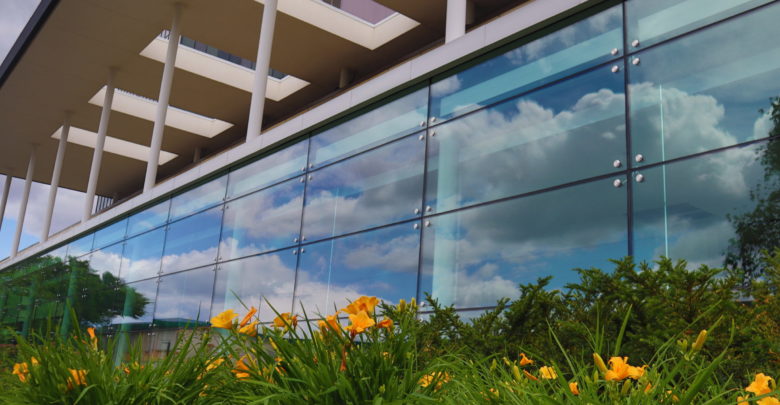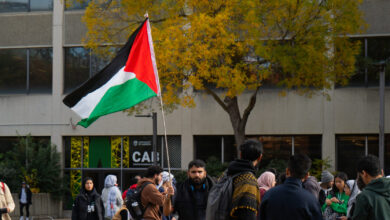Diminishing third places and the students working to revive them
With vanishing third places a cause for concern world wide, how have U of A students worked to address this on campus?
 Lily Polenchuk
Lily PolenchukThird places are community hubs, separate from home and work, that allow for social interaction and leisure. Common examples include libraries, gyms, and cafes. Sociologist Ray Oldenburg first coined the term. In his essay, “Our Vanishing Third Places,” Oldenburg argued that “what suburbia cries for are the means for people to gather easily, inexpensively, regularly, and pleasurably — a ‘place on the corner,’ real life alternatives to television.” He believed that a thriving community requires third places to act as vessels for socialization between individuals.
Recently, there’s been much discussion about the lack of third places in our local communities. Edmonton seems to be ever-expanding, with creeping suburbs continuing to push the city in just about every direction. Urban sprawl and dependence on automobiles both threaten the existence of third places. Strict zoning laws that ban commercial establishments from residential areas only worsen this issue, according to Oldenburg.
While third places may be lacking in our suburban communities, the same cannot be said about our campus community at the University of Alberta. While finding community can be difficult, university campuses offer the unique ability to “find your people.” But, that community isn’t inherent in a university campus. With hundreds of clubs and student groups encompassing countless interests, how have students worked to remedy the drought of third places?
The U of A Minecraft Club and the possibility of virtual third places
Oldenburg made the argument that television was an insufficient substitute for real third places. In our current day, the internet takes on this role. Through online communities and social media, we are more connected than ever with the rest of the world. Yet, many experience minimal face-to-face interaction with members of their own local community. However, could online spaces grounded in a common local community be a valid substitute for physical third places?
Take for example the U of A Minecraft Club. The club’s Discord server has amassed over 1,300 members. Through the Discord, members can communicate with each other and organize meet-ups, both in-person or on their Minecraft servers.
Minecraft Club President Jacob Hasell explained that in-person events help “tie the person online to the real person.”
Unlike most other clubs at the U of A, students can access the Minecraft Club at home, at any time.
“With online events, it is easier for the scheduling to work out. Lots more people can engage with club activities.”
Minecraft is a very popular game, especially among this current generation of students. This allows the club to appeal to a wider demographic of people.
“A lot of people have played the game, so it’s easier to relate to people,” Hasell said.
Marketing Vice-president Finn Nickolson spoke to the flexibility that a game like Minecraft provides. Players can interact with their worlds and create their own digital spaces or travel through game generated landscapes.
“Minecraft is such a good game for a club like this, because it’s such a sandbox type game. Anyone can play any type of way they want,” Nickolson said.
The Minecraft Club has embraced the connection between physical and digital space with their Campus Recreation Project.
“We have the Campus Recreation Project, which is where we try to recreate the buildings on campus,” Hasell said.
He explained that the goal of this project is to make the university less daunting to navigate for new students by allowing them to experience the campus in a game they are familiar with.
Hide and Seek Club aims to combat student stress and connect people
New and old students can also explore campus through the classic game of hide and seek. Every week, members of the Hide and Seek Club meet at a new building on campus to play three 15-minute rounds of hide and seek.
Steven King, the president of the Hide and Seek club, is a student in the faculty of science. He explained that the club has a diverse demographic, drawing in members from various faculties. These students may not have had the opportunity to otherwise meet. Joining the Hide and Seek Club aids members in “expanding their horizons,” King explained.
Furthermore, King noted the importance of joining clubs based around leisure and relaxation. “If you just focus purely on school, there’s quite a bit of stress. Having a fun activity you can do definitely helps people.”
According to King, clubs that are based around leisure can still provide students with important experiences and friendships. He explained that he has formed valuable friendships with both current and previous members of the Hide and Seek club.
Additionally, by taking on leadership roles for this club, he has benefited in other aspects of his life.
“I have the responsibility, that kind of keeps me grounded when I need to get my classwork done as well.”
“It was a frustration that there was nowhere for political science students to meet after classes,” WIPS founder says
Beyond providing the rare opportunity for leisure, many clubs on campus are oriented towards certain subject areas and careers. These clubs provide a space for students to meet like-minded individuals and unite over their common interests and passions.
The founder of Women in Political Science (WIPS), Camille Hill, revealed that the club began because “a lot of women, myself included, felt ourselves forced out in a lot of other spaces.”
While the club started as a way to provide a space for women in political science, the club is not limited to political science students alone.
“We’ve decided really early on that to have a club centered around one identity or one idea actually isn’t community building. Because for instance, you could be a member of our club who was once in political science and has left. Are you excommunicated?”
Hill explained that she was inspired to create WIPS as a physical and intellectual space for students interested in political science. Her motivation was born out of “sheer frustration.”
“It was a frustration that there was nowhere for political science students to meet after classes.”
Furthermore, Hill spoke to the isolation that many university students feel as another motivation for organizing and devoting a significant portion of her time to this club.
“I know that university is such a lonely time. It’s legitimate to feel that way. I think it’s our responsibility as students to begin [clubs] if we’re feeling these frustrations.”
U of A Debate Society aims to “bring people in to make sure everyone feels comfortable,” former president says
While debate may seem like a confrontational or divisive activity, the University of Alberta Debate Society (UADS) prides itself on the lifelong friendships and bonds created between members. Ken Tieu previously served as president of UADS. He stressed that a supportive dynamic between members is necessary for the success of debate.
“Obviously, public speaking is something that is difficult for a lot of people, including members of the club. I think that’s something that the club is always very cognizant of, and always makes a very active effort to bring people in to make sure that everyone feels comfortable,” Tieu said.
Furthermore, Tenisha Brar, Women and Gender Minorities Member at Large, spoke to how UADS fosters a welcoming environment for individuals previously excluded from the field.
“There’s not as much as a divide. The community as a whole is very blended,” Brar said.
UADS meetings incorporate both seminars and debate practice where members divide themselves into either judges or debaters. Novice Member at Large Mia Benjatschek explained that participation in debate builds core skills such as analytical thinking and critical reasoning, as well as communication skills.
UADS has also managed to foster community beyond campus, according to President Neil Roy Choudhury. For tournaments, members travel all over the country and meet other likeminded students.
“I think the debate community in Canada is pretty tight, and especially Western Canada, so we all get to know each other just for going to these tournaments,” Choudhury said.
Choudhury stated that joining UADS helped improve his own university experience. He was motivated to take on an executive position to pass on this same experience to others.
“It’s just so rewarding because you see people having fun and building that community that continues afterwards,” Choudhury said.
Alpha Gamma Delta aims to “create space where members can come in and feel as though they have a home,” president says
A challenge that the U of A faces when it comes to maintaining and building a sense of campus community is the fact that it is largely a commuter campus. Many students live off campus and as a result, feel as though they are not receiving the full post-secondary experience.
Quinn Tilling, the chapter president of the women’s fraternity Alpha Gamma Delta, explained that “it can be really difficult to form substantive relationships with other students outside of solely the academic class or lab context.”
However, Greek Life organizations such as Alpha Gamma Delta differ from other student groups in that they provide housing and a permanent, physical space for their members. Alpha Gamma Delta is composed of residents who live at the sorority house as well as members who live off-campus.
“We really try to create a space where members can come in and feel as though they have a home on a commuter campus,” Tilling said.
For Tilling, joining Alpha Gamma Delta allowed her to gain a strong sense of community among her fellow members. “You’re able to explore all of those different dimensions of college life together,” Tilling explained.
Furthermore, Tilling shared that joining Alpha Gamma Delta has afforded her many volunteering opportunities. The main philanthropic focus of Alpha Gamma Delta is addressing food insecurity.
Currently, there are four active women’s fraternities (also referred to as sororities) at the U of A. In recent years, there has been a growing interest in Greek Life organizations. The sorority recruitment processes at American colleges have been widely documented on social media and scrutinized.
“There’s often these misconceptions about why people get involved in Greek life, especially with common popular culture and media presentations. But, for the vast majority of people, it’s about contribution to collective good,” Tilling said.
University can be a very isolating experience for students who are buried under their intense workload. Students can feel trapped in an endless cycle of commuting from home to school with little time for much else. Despite the U of A’s reputation as a commuter campus, students have worked to create various outlets and third places on campus where students can turn to for support and comraderie.




